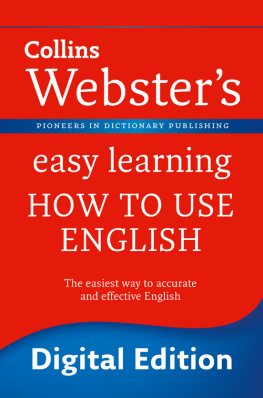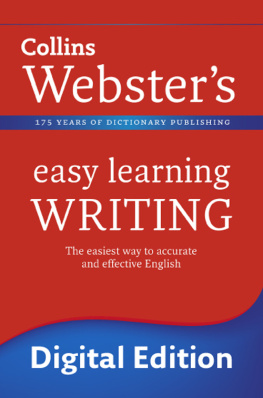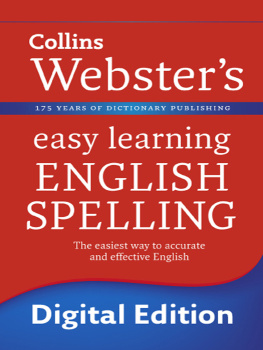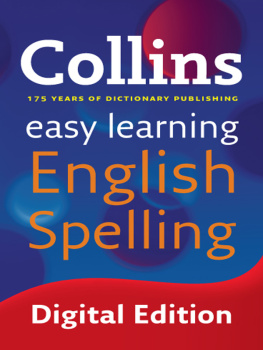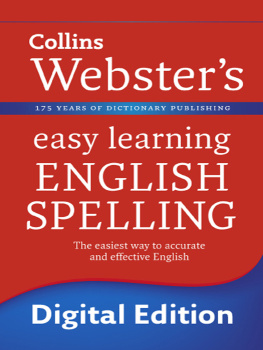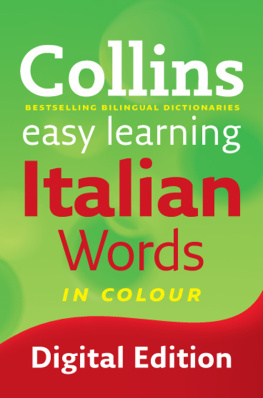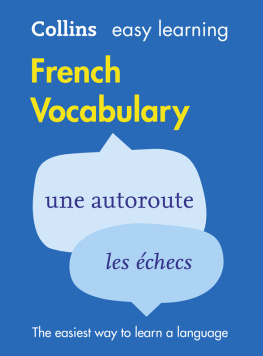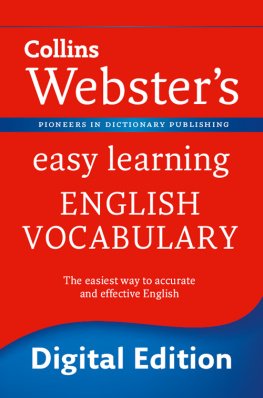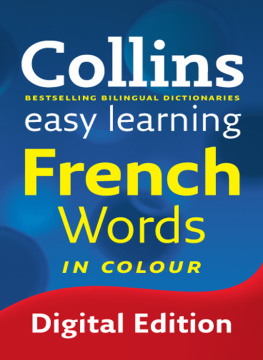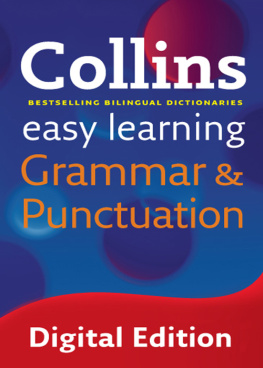introduction
Collins Websters Easy Learning How to Use English is designed for anyone who wants to improve their ability to use English accurately. Whether you are preparing for an exam, or you are curious about how a particular word is used, or you simply want a quick guide to common mistakes and how to correct them, Collins Websters Easy Learning How to Use English offers you the information you require in a clear and accessible format.
This book focuses on words and structures that often cause problems. Here are some examples of the kinds of problems that are covered:
words that are easily confused. For example, hard and hardly look similar, but they have very different meanings.
words that have similar meanings but are used in different grammatical ways. For example, allow and let have the same meaning, but we allow someone to do something, whereas we let someone do something.
common words that have a lot of different meanings in English, such as take, at, and better.
words that are used with particular prepositions, for example, look for and look after; made from, made of, and made out of.
common false friends: English words that look similar to words in other languages, but have different meanings.
You will also find information on which uses are more suitable for formal English (for example, when writing essays) and which ones are more suitable for informal English (for example, when writing emails or in everyday conversation). In addition, there are notes on some of the differences between British English and American English.
Collins Websters Easy Learning How to Use English is arranged alphabetically, so that you can easily find what you are looking for. There are also ten topic sections at the end, where some sets of words and structures are covered together.
For more information about Collins dictionaries, you can visit us at www.collinslanguage.com.
guide to entries
| Entries are organized in alphabetical order. | 
| accommodations |
| This information explains clearly and simply what a word or phrase means, and how to use it. | 
| Accommodations are where you live or stay, especially when you are on vacation or when you are staying somewhere for a short amount of time. You use accommodation when the next word is a noun, or when you are talking about the activity of staying somewhere. |
| Examples from the Collins Corpus show how words and phrases are used in real English. | 
| The package includes our flights and accommodations on the island.
What level of accommodation do you require for your visit?
The resort has a number of accommodation options. |
| Common differences between American and British English are shown. | 
| In British English, accommodation is a noncount noun and the plural accommodations is not used for this meaning. |
alone lonely
| Entries that deal with different words, senses or uses are clearly divided into sections. | 
| alone
If you are alone, you are not with any other people.
I wanted to be alone. |
| Special notes give you extra information and highlight common mistakes. | 
| Dont use alone in front of a noun. For example, dont talk about an alone woman. Instead, say a woman on her own. |
| Crossed-out examples show incorrect uses. The correct form is given in a typical example of everyday use. | 
| These resorts are popular with people on their own . |
| Cross-references show other entries or topics where you can find more information. | 
|  see also topic: see also topic: |
grammatical terms
adjective: a word that is used for telling you more about a person or thing. You use an adjective to talk about appearance, color, size, or other qualities, e.g., A tall woman; She has brown eyes; My gloves are wet .
adverb: a word that gives more information about when, how, or where something happens, e.g., See you tomorrow ; He spoke slowly ; I want to get down .
auxiliary verb: a verb that is used with another verb in perfect and progressive forms, or to form questions, negatives, and passives. The main auxiliary verbs in English are be, have, and do, e.g., Is it snowing?; I have never been to Washington; We dont have a computer at home.Modal verbs are also a kind of auxiliary verb.
clause: a group of words containing a verb. Some sentences contain one clause, e.g., I fell asleep . Other sentences contain more than one clause, e.g., When I told him, he laughed; I want to go but I feel too ill .
comparative: an adjective or adverb with -er on the end or more in front of it, e.g., taller, more beautiful, more carefully .
conjunction: a word such as and, but, if, and since. Conjunctions are used for linking two words or clauses, e.g., I enjoyed my vacation, but it wasnt long enough; James and Ewan came to the party; If you miss your bus, youll have to walk home.
count noun: a noun used for talking about things that can be counted. Count nouns have both singular and plural forms, e.g., This is a lovely house ; They are building several new houses .
determiner: a word such as a, the, that, or my, which you put in front of a noun to show which person or thing you mean, e.g., This is his car; Look at that bird.
future form: a form with will, shall, or be going to, which you often use when you are talking about the future, e.g., He will come soon; Im going to visit Sarah.
infinitive: the base form of a verb, which can be used with or without to, e.g., (to) see; (to) bring.
infinitive withoutto: the infinitive of a verb without to, e.g., Let me think ; I must go .
-ingform: a verb that ends in -ing. -ing forms are used in the progressive, and also after certain verbs, e.g.,

